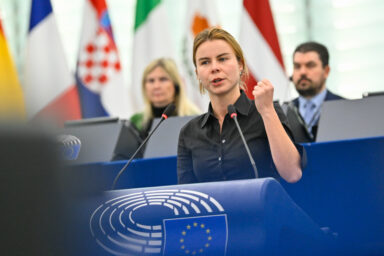MEPs overhwelmingly backed the review of European Social Fund Plus on Wednesday, 10 September, despite tensions over rule-of-law rules. The move comes as the Union seeks specific measures to address new strategic challenges.
The legislation passed with 453 votes to 149 and 59 abstentions. Rapporteur Marit Maij (S&D/NDL) offered a comment: “We stand for a Europe that defends its external safety and leaves no one behind. We have managed to safeguard the main mission of the European Social Fund Plus (ESF+), supporting the most vulnerable people and children, and helping smaller beneficiaries in civil society.“
The Dutch social democrat, however, also mentioned the new priorities. “We also made sure money allocated for the defence industry will be used for skills development in dual-use technologies and making sure people possess the skills they need to have a place in our society,” she said.
Massive reallocation
Less than 24 hours before the vote, the European Parliament Strasbourg plenary session saw a heated debate on the measure. The ESF+ has been the EU’s primary vehicle for skills development and social inclusion since 1957. The mid-term review, sparked by geopolitical and economic crises, aimed to redirect funds towards defence, cybersecurity, and green industries while preserving the fund’s social mission. Divisions flared over whether flexibility would empower or undermine Europe’s neediest.
Roxana Mînzatu, the Commission’s executive vice-president, opened by endorsing the reform as vital for competitiveness. “Investing in people is essential for advancing our strategic priorities,” she said, citing skills shortages in defence and digital sectors.
You might be interested
The deal lets member states reallocate ESF+ money to these areas while upholding rule-of-law checks—a nod to concerns over Hungary’s access to frozen funds. Ms Mînzatu stressed that a Commission declaration would ensure funds flow only to states respecting democratic norms.
Investing in people is essential for advancing our strategic priorities. — Roxana Mînzatu, EC Vice-President
Ms Maij struck a cautious tone. While welcoming compromises to prioritise small NGOs and dual-use skills training, she warned against diluting ESF+’s core purpose. “We cannot accept flexibility if the rule of law is not respected,” she said, demanding “earmarked funding” for child poverty and youth employment. Ms Maij praised safeguards ensuring large defence firms only receive funds in poorer regions but warned the fund must remain “self-standing”—not a “cash dispenser for member states”.
Arsenals over people?
MEP Urmas Paet (Renew/EST) backed the defence pivot, arguing bureaucracy must not hinder “Europe’s preparedness”. His call for rapid eastern-border investments found sympathy with Marlena Maląg (ECR/POL), who noted her country’s frontline role against “Putin-inspired” threats.
Critics countered that militarising ESF+ risks abandoning the vulnerable. MEP Estrella Galan (The Left/ESP) lambasted the “disdain” of prioritising “arsenals over people”, while Gabrielle Bischoff (Green-EFA/DEU) warned against centralising control. “We must work with regions, not override them,” she said.
Without (social cohesion), we are doomed. — MEP Marit Maij (S&D/NDL)
Rule-of-law tensions simmered. MEP Jean-Marc Germain (S&D/FRA) accused Hungary of “riding roughshod” over EU values, demanding no funds flow while it “bans pride marches”. Brigitte Vandenberg (Renew/NDL) echoed this, pressing Ms Mînzatu to confirm Hungary would remain excluded. Sandro Gozi (Renew/FRA) warned against “totalitarian drift”, urging “rigorous” oversight. Far-right voices dissented: Séverine Werbrouck (PfE/FRA) dismissed the reforms as “costly ideology”, arguing defence spending should bypass EU “arbitrary controls”.
Conditionality to be applied ‘strictly’
Economic anxieties surfaced. Alexander Jungbluth (ESN/DEU) linked Germany’s recession to EU policies, demanding ESF+ redress “billions” paid into the bloc. Ms Mînzatu, responding to critiques, insisted reforms would “create jobs in cutting-edge sectors” without abandoning social goals. She reaffirmed that rule-of-law conditionality would apply “strictly”—a pledge met with scepticism.
The debate crystallised a core dilemma: can ESF+ address existential threats without betraying its founding mission? Ms Maij closed by framing social cohesion as non-negotiable: “Without it, we are doomed,” she said. The vote, Ms Maij urged, must mark a “beginning”—ensuring future budgets shield the vulnerable while adapting to crises.
The regulation is now awaiting adoption by the Council. It will take effect after publication in the EU Official Journal.











